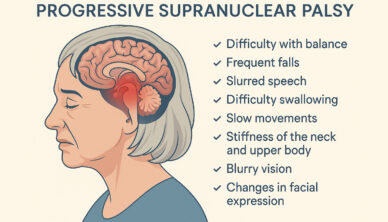Contents
Progressive Supranuclear Palsy

Understanding Progressive Supranuclear Palsy
Progressive Supranuclear Palsy (PSP) is a rare neurological condition that causes serious problems with balance, movement, vision, speech, and swallowing. It is caused by the gradual deterioration of cells in areas of the brain that control body movement and cognitive function.
At the Royal Buckinghamshire Hospital, our neurorehabilitation specialists provide expert diagnosis and personalised treatment plans to support patients living with PSP and similar complex conditions.
Common Symptoms of PSP
The symptoms of PSP often develop gradually and worsen over time. Early signs may be mistaken for Parkinson’s disease or general ageing. Common symptoms include:
- Difficulty with balance and frequent falls (especially backwards)
- Stiffness in the neck and upper body
- Slowness of movement (bradykinesia)
- Blurry vision or difficulty moving the eyes up and down
- Changes in facial expression (reduced blinking or masked face)
- Speech difficulties (dysarthria)
- Problems with swallowing (dysphagia)
- Mood changes, apathy, or depression
- Mild memory or cognitive difficulties
As the disease progresses, symptoms may significantly impact daily activities, mobility, and independence.
Diagnosis of Progressive Supranuclear Palsy
There is no single test to diagnose PSP. Diagnosis is based on clinical examination, medical history, and specialist neurological assessment. At the Royal Buckinghamshire Hospital, your evaluation may include:
- Neurological examination by a consultant neurologist
- MRI scans to rule out other brain conditions
- Eye movement tests
- Cognitive and physical assessments by our multidisciplinary team
Early and accurate diagnosis allows better planning and management of the condition.
Treatment and Rehabilitation at Royal Buckinghamshire Hospital
There is currently no cure for PSP, but treatment focuses on managing symptoms and improving quality of life. Our team offers an integrated, multidisciplinary approach that may include:
- Physiotherapy – To maintain mobility and prevent muscle stiffness
- Occupational Therapy – Supporting daily activities and home safety
- Speech and Language Therapy – For swallowing and communication support
- Nutritional support – Helping with safe eating and drinking
- Assistive technologies and mobility aids
Support for Patients and Families
Living with a rare condition like PSP can be challenging. We provide ongoing support for both patients and caregivers, including education, psychological support, and practical advice for long-term care planning.
We provide compassionate, multidisciplinary care that supports physical, emotional, and cognitive recovery.
- Leading experts in complex neurological conditions
- State-of-the-art rehabilitation facilities
- Personalised, patient-centred treatment plans
- Holistic approach to care with family involvement
- Private en-suite rooms and guest accommodation for loved ones
3 June 2025
